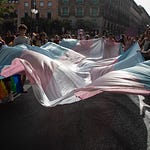[This blog will always be free to read, but it’s also how I pay my bills. So, if you like what you read, please consider a paid subscription.]
In an exclusive interview with Associated Press reporter Nicole Winfield, published this morning, Pope Francis said homosexuality should not be a crime and called upon all countries with such laws—67 of them in total—to decriminalize.
There are currently three majority-Catholic countries that criminalize homosexuality: Burundi, Kiribati, and Saint Lucia.
There are also a few countries with a substantial Catholic population that criminalize homosexuality, Rwanda (49.5%) being the most prominent in this group.
Francis was intentional about making a distinction between homosexuality being a “sin”—which he believes it to be—and being a criminal act, which he believes it should not be.
This is arguably the strongest statement of support for LGBTQ rights from Francis since the beginning of his papacy. Over the years, he has periodically made headlines with his openness on topics of sexual morality.
The most famous example was in 2013 when Francis said to a reporter: “If a person is gay and seeks God and has good will, who am I to judge?”
In 2018, Francis urged the parents of gay children to maintain their relationships and love them and “not throw them out of the family.”
In 2020, he sent a handwritten note of praise to a Carmelite nun in Argentina who opened a permanent safe house for transgender women, noting: “God, who didn’t attend seminary and didn’t study theology, will reward you generously. I pray for you and your daughters.”
In 2021, he made clear his support for same-sex civil unions as a logical compromise against same-sex marriages.
Throughout his tenure, the Pope has attempted to traverse a tricky middle-ground between maintaining support for traditional Catholic views on sexual morality and expanding access to the Church for LGBTQ people and condemning abuse toward them. This has brought substantial criticism from both sides of the debate; social conservatives believe he’s overstepping his bounds and many social progressives reject his efforts as not nearly enough.
As a trans woman and Christian, I think the Pope’s actions have been great in the context of how substantially worse he could be. I don’t expect the Catholic Church to change its official views on LGBTQ identities in my lifetime, but it would be nice if we could all offer a baseline of respect for each other. In my humble opinion, Francis has certainly exceeded expectations.
I take the Pope at his word when he maintains that being LGBTQ is sinful (I firmly disagree, of course), but I respect that he has been steadfastly committed to: 1) a clear separation of Church and State on these matters and 2) encouraging the inclusion of LGBTQ people in the Church. It is especially meaningful when he insists that LGBTQ people are entitled to a family, even if that family structure is imperfect in the eyes of traditional Catholics.
I’ll be honest with you folks: this is a great thing, and I’m pretty exhausted with some progressives who, beyond being unsatisfied, have attempted to downplay the Pope’s efforts on LGBTQ equality.
This morning’s announcement is an enormous step forward, particularly in an era that has seen a heartbreaking backlash against LGBTQ advancement in recent years, all over the world.
Some people deeply struggle with the very simple concept that demanding total and complete change overnight is not only damn near impossible but can be enormously counterproductive, especially in response to a moment of progress. It comes across as performative and naïve.
Do I love that Francis has described transgender people like me as “lepers”, as though I am diseased and in need of specific ministry? No, of course not, but I’m also not gonna let that get in the way of meaningful progress. When the Pope says something that is likely to reduce violence and discrimination against my community, I’m gonna loudly praise it and hope anyone within earshot has their heart softened.
Lost in most of the discussion on this morning’s news will be the significant matter of continuity in papal leadership. There are currently 124 cardinal electors (that is, cardinals who are presently eligible to vote in a papal conclave), and Francis has created 81 of them. A new pope is elected with 2/3 of eligible cardinal electors, so a current threshold of 83 if all eligible voters were to participate in a conclave today.
That doesn’t mean the next pope is likely to be as progressively attuned as Francis, but he has undoubtedly made it highly unlikely that his successor will be a hard conservative in the mould of Benedict XVI.
Bottom line: don’t buy the nonsense view that this isn’t a big deal or that it won’t be helpful to LGBTQ people. Folks throwing out such criticism are allowing the perfect to be the enemy of the good at a time in history when there’s not been much good to go around.
Let the good flourish and plant more seeds.
Hi, I’m Charlotte Clymer, and this is Charlotte’s Web Thoughts, my Substack. It’s completely free to access and read, but it’s also how my bills! So, please do kindly consider upgrading to a paid subscription: just $7/month or save money with the $70/annual sub. You can also go way above and beyond by becoming a Lifetime Member at $210.














Share this post